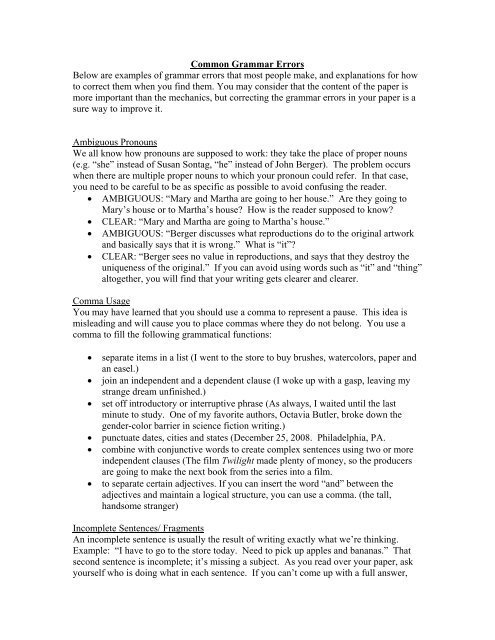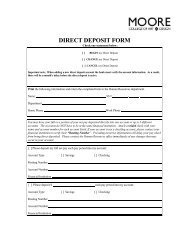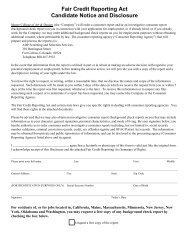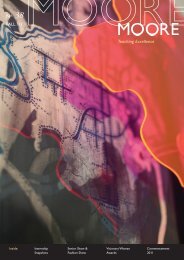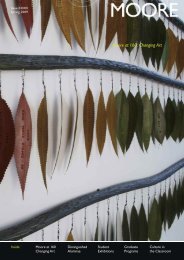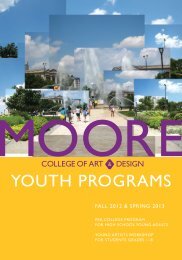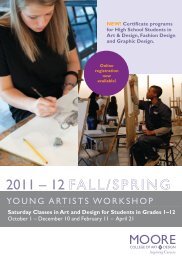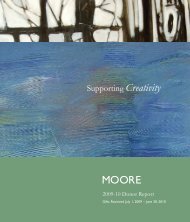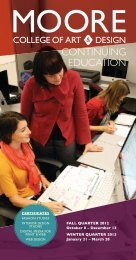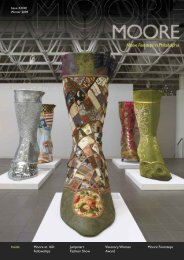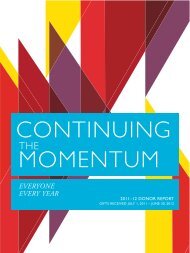Common Grammar Errors
Common Grammar Errors
Common Grammar Errors
Create successful ePaper yourself
Turn your PDF publications into a flip-book with our unique Google optimized e-Paper software.
<strong>Common</strong> <strong>Grammar</strong> <strong>Errors</strong>Below are examples of grammar errors that most people make, and explanations for howto correct them when you find them. You may consider that the content of the paper ismore important than the mechanics, but correcting the grammar errors in your paper is asure way to improve it.Ambiguous PronounsWe all know how pronouns are supposed to work: they take the place of proper nouns(e.g. “she” instead of Susan Sontag, “he” instead of John Berger). The problem occurswhen there are multiple proper nouns to which your pronoun could refer. In that case,you need to be careful to be as specific as possible to avoid confusing the reader.• AMBIGUOUS: “Mary and Martha are going to her house.” Are they going toMary’s house or to Martha’s house? How is the reader supposed to know?• CLEAR: “Mary and Martha are going to Martha’s house.”• AMBIGUOUS: “Berger discusses what reproductions do to the original artworkand basically says that it is wrong.” What is “it”?• CLEAR: “Berger sees no value in reproductions, and says that they destroy theuniqueness of the original.” If you can avoid using words such as “it” and “thing”altogether, you will find that your writing gets clearer and clearer.Comma UsageYou may have learned that you should use a comma to represent a pause. This idea ismisleading and will cause you to place commas where they do not belong. You use acomma to fill the following grammatical functions:• separate items in a list (I went to the store to buy brushes, watercolors, paper andan easel.)• join an independent and a dependent clause (I woke up with a gasp, leaving mystrange dream unfinished.)• set off introductory or interruptive phrase (As always, I waited until the lastminute to study. One of my favorite authors, Octavia Butler, broke down thegender-color barrier in science fiction writing.)• punctuate dates, cities and states (December 25, 2008. Philadelphia, PA.• combine with conjunctive words to create complex sentences using two or moreindependent clauses (The film Twilight made plenty of money, so the producersare going to make the next book from the series into a film.• to separate certain adjectives. If you can insert the word “and” between theadjectives and maintain a logical structure, you can use a comma. (the tall,handsome stranger)Incomplete Sentences/ FragmentsAn incomplete sentence is usually the result of writing exactly what we’re thinking.Example: “I have to go to the store today. Need to pick up apples and bananas.” Thatsecond sentence is incomplete; it’s missing a subject. As you read over your paper, askyourself who is doing what in each sentence. If you can’t come up with a full answer,
verb tense corresponds to the time period about which you are writing. When you writeabout a literary text, use the present tense, because the text itself always exists.• INCORRECT: Since we’re in a recession, we had to be more careful withmoney.• CORRECT: Since we’re in a recession, we have to be more careful with money.OR: Since we entered a recession, we’ve had to be more careful with money.• INCORRECT: In the past, countries fight wars to gain control of territories.• CORRECT: In the past, countries fought wars to gain control of territories.• INCORRECT: In Act I of Troilus and Cressida, Troilus said that Cressida’sbeauty outshined Helen’s.• CORRECT: In Act I of Troilus and Cressida, Troilus says Cressida’s beautyoutshines Helen’s.Misused HomonymsHomonyms are words that sound alike but are spelled differently and have differentmeanings.• there (place, location: I left the book over there.); their (possession: It’s theirhome.); and they’re (contraction meaning “they are”: They’re coming over forthe holidays.)• it’s (contraction meaning “it is”: It’s beginning to look a lot like Christmas) andits (possession: The dog ate its food.)• know (to have knowledge: I know what I’m doing.) and no (negative response:No, I don’t want to talk about grammar anymore.); knew (had knowledge: I knewwe were going to keep talking about grammar) and new (opposite of old: It’s timeto introduce a new subject.)


